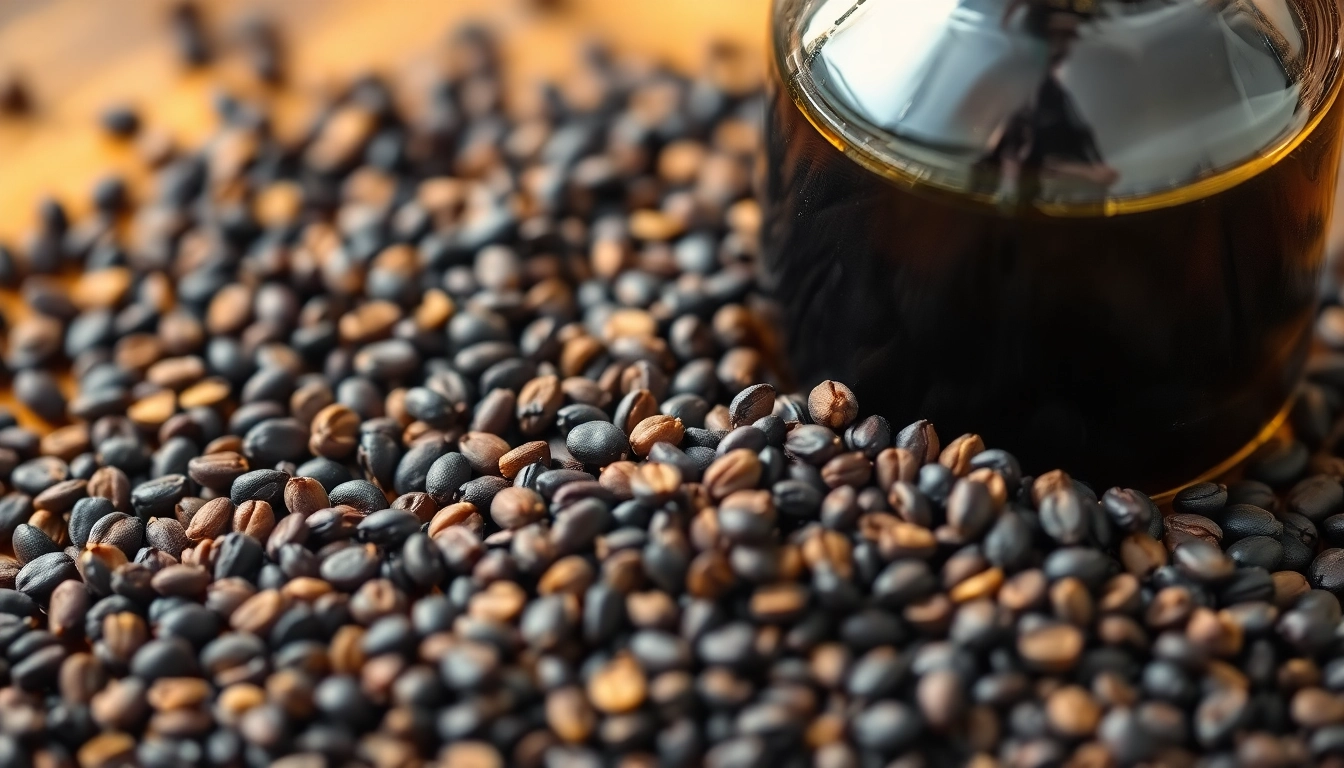Understanding Black Seed Oil
What is Black Seed Oil?
Black seed oil, derived from the seeds of the Nigella sativa plant, has been celebrated for its medicinal properties for centuries. Known for its rich composition of beneficial compounds, including thymoquinone, it boasts a range of therapeutic properties. This oil is often incorporated into dietary supplements, topical treatments, and beauty products, making it a versatile addition to health and wellness routines. Black seed oil offers a plethora of potential health benefits, including anti-inflammatory, antioxidant, and antibacterial effects.
The History and Cultural Significance of Black Seed
The use of black seed dates back to ancient Egypt, where it was discovered in the tomb of Tutankhamun and regarded as a remedy for various ailments. Historically, black seed has been used in traditional medicine across many cultures, including Ayurvedic practices in India and Arabic medicine. Both the oil and seeds were valued for their healing properties, believed to boost immunity, aid digestion, and protect against various diseases.
Islamic texts also reference black seed as a healing miracle, with the Prophet Muhammad stating, “In the black seed, there is healing for every disease except death.” This legacy underlines its significance across various traditions and promotes its continued use in modern health practices.
How is Black Seed Oil Made?
The extraction of black seed oil primarily occurs through a process of cold-pressing, which helps retain the oil’s delicate nutrients and compounds. The seeds are first harvested and then subjected to mechanical pressure to extract the oil without applying heat, thus preserving its beneficial properties. The oil varies in color—ranging from a deep amber to a golden hue—and is characterized by its distinct, pungent flavor and aroma.
Quality control during extraction is critical to ensure the purity and potency of black seed oil. Consumers seeking its benefits should look for cold-pressed, organic varieties that are labeled as free from additives or preservatives.
Health Benefits of Black Seed Oil
Anti-inflammatory Properties and Skin Health
One of the most notable benefits of black seed oil lies in its potent anti-inflammatory properties. Thymoquinone, a major active compound, has been extensively studied for its ability to reduce inflammation and oxidative stress in the body. These properties make black seed oil an excellent option for individuals suffering from skin conditions such as acne, eczema, and psoriasis.
Research indicates that applying black seed oil directly to the skin can alleviate symptoms associated with these conditions by soothing irritation and redness. Daily use can also promote overall skin health by enhancing moisture retention and providing essential fatty acids crucial for skin cell regeneration.
Beyond topical applications, incorporating black seed oil into the diet can offer systemic anti-inflammatory benefits, potentially aiding in conditions such as arthritis by reducing joint pain and stiffness. This dual approach—using the oil both internally and externally—can maximize its skin health benefits.
Supporting Metabolism and Digestion
Black seed oil may also play a significant role in supporting metabolic health. Studies suggest that it can aid in regulating blood sugar levels, making it a beneficial supplement for those with diabetes or those looking to maintain their metabolic health. The oil has been shown to improve insulin sensitivity, which is crucial for effective blood sugar management.
Moreover, black seed oil has been traditionally used to enhance digestive health. Its carminative properties help alleviate gas, bloating, and other gastrointestinal discomforts. Regular consumption could result in improved digestion and nutrient absorption.
For individuals looking to lose weight or manage their weight, black seed oil may help by enhancing the sensation of fullness and decreasing appetite, further supporting a healthy metabolism.
Impact on Hair Growth and Health
The benefits of black seed oil extend to hair health as well. Its high concentration of essential fatty acids and vitamins nourishes hair follicles, potentially promoting hair growth and improving overall hair health. Many people suffering from hair loss or thinning hair report positive results after using black seed oil as a topical treatment.
In addition to promoting growth, black seed oil is effective in combating dandruff and dry scalp conditions due to its moisturizing properties. Massaging the oil into the scalp can improve blood circulation and encourage healthy hair roots, leading to stronger and shinier hair over time.
For optimal results, individuals can combine black seed oil with natural essential oils (like rosemary or peppermint) to enhance its effectiveness and provide additional nourishment to the scalp and hair.
Using Black Seed Oil Effectively
Recommended Dosage and Forms of Consumption
The efficacy of black seed oil depends largely on the form and dosage used. While there is no universally recommended dosage, many studies suggest that 1-2 teaspoons (5-10 mL) of black seed oil per day can provide beneficial effects. It can be taken alone or added to smoothies, salads, or other dishes. Capsules containing black seed oil are also available as an alternative for those who prefer a more convenient option.
It’s vital to start with a lower dose and gradually increase it to monitor how your body responds, especially if you have underlying health conditions or are taking medications. As with any supplement, consult a healthcare provider to determine the appropriate dosage for your individual needs.
Topical Applications for Skin and Hair Care
For topical applications, black seed oil can be used directly on the skin or hair. For skin health, apply a few drops directly to the affected area and massage gently. This method can be beneficial for acne-prone skin, dry patches, or areas affected by inflammation. To enhance absorption, combine the oil with a carrier oil like jojoba or coconut oil.
For hair care, consider using black seed oil as a pre-shampoo treatment. Apply the oil to your scalp and hair, let it sit for 30 minutes to an hour, and then wash it out with a mild shampoo. This method can help improve hair texture and appearance while providing hydration to the scalp.
Incorporating into Your Daily Routine
Incorporating black seed oil into your daily routine can be straightforward. You can begin by adding it to your morning smoothie or utilizing it as a salad dressing. Additionally, consider using it in cooking, although it’s best to avoid high-heat methods to preserve its nutritional potency.
For skin care, consider using black seed oil as a part of your nightly routine, applying it as a moisturizer after cleansing. Alternatively, mix it into your existing skincare products to amplify their effects. For hair care, utilizing it in your weekly hair mask can provide significant benefits over time.
Consistency is key when using black seed oil—regular use will yield the best results. Maintaining a balanced diet and a healthy lifestyle alongside its usage will further amplify its benefits.
Potential Side Effects and Warnings
Who Should Avoid Black Seed Oil?
While black seed oil is generally considered safe for most people, there are some individuals who may need to avoid its use. Pregnant and breastfeeding women should refrain from using black seed oil due to a lack of sufficient research regarding its effects on fetuses and infants. Moreover, if you have a known allergy to plants in the Ranunculaceae family, you should avoid black seed products to avert potential allergic reactions.
Individuals with underlying health conditions, particularly those relating to the liver or those who are on blood-thinning medications, should consult a healthcare provider before incorporating black seed oil into their regimen.
Understanding Allergic Reactions and Interactions
Allergic reactions, although rare, can occur with black seed oil. Symptoms may include rashes, itching, or difficulty breathing. If any adverse reactions occur, discontinue use immediately and seek medical attention. Additionally, black seed oil may interact with certain medications, particularly those affecting blood pressure and diabetes management. Always consult a healthcare provider for advice on how to integrate black seed oil safely into your health routine.
Consulting Healthcare Providers
Before starting any new supplements, it is essential to have an open dialogue with your healthcare provider, especially if you are existing on multiple medications or have pre-existing conditions. Healthcare professionals can provide tailored guidance on how to effectively incorporate black seed oil into your routine, considering your unique health profile.
Choosing Quality Black Seed Oil Products
What to Look for in Black Seed Oil
When selecting black seed oil, quality is paramount. Look for products that specify “cold-pressed” extraction, as this method retains the beneficial compounds. Additionally, opt for organic certifications to ensure the product is free from harmful pesticides and preservatives. Dark glass bottles are preferred for packaging, as they help protect the oil from light exposure that can degrade its quality.
Moreover, transparency in sourcing and testing is a good indicator of product quality. Brands that offer certificates of analysis or third-party testing can provide reassurance regarding the purity and potency of their oils.
Comparing Different Brands and Products
The market is saturated with black seed oil products, so comparing different brands can be beneficial to identify the best option for your needs. Consider reading customer reviews, checking for certifications, and assessing ingredient lists. While price can be a factor, investing in a high-quality product will yield better results.
Consider also the form in which the oil is offered—liquid or capsules. Depending on your lifestyle and preferences, one may be a better fit than the other.
Misinformation in the Market: What to Avoid
As black seed oil gains popularity, misinformation and exaggerated claims can fill the marketplace. It’s crucial to be wary of products advertised with miraculous health claims that sound too good to be true. Effective marketing doesn’t always equate to quality or efficacy. Stick to well-reviewed products from reputable brands that provide clear information about their ingredients and potency.
Always do your own research before purchasing to understand the benefits and limitations of the product you are considering. Education is key to navigating this vast supplement market.



